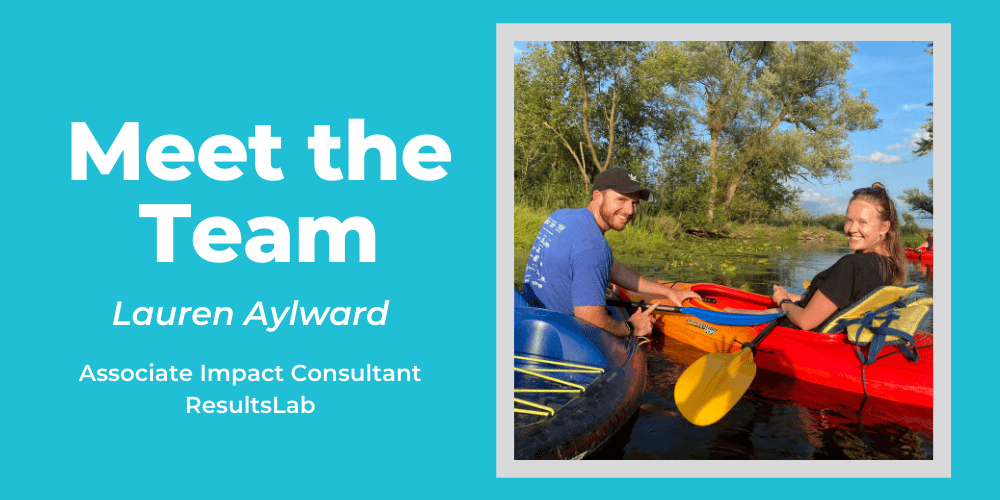It’s a Meet the Team blog post kind of day, and today, we’re highlighting Lauren Aylward, Associate Impact Consultant here at ResultsLab.
Lauren strives to take a human-centered approach to all the work she does and to find ways to make data and evaluation more accessible and approachable for all. Lauren has a background in both international and local development work, having served in Peace Corps in Cambodia and having worked in community resource development at Mile High United Way, in Denver. She has extensive experience working with people from diverse backgrounds and all kinds of walks of life and is passionate about helping nonprofits more deeply infuse community voices into their work.
Now, it’s time to hear from Lauren.
Q: What inspired you to pursue a career in evaluation and data use?
I have always wanted to be in a role that serves and empowers others. Historically, I have held roles that are more direct service and community-facing. Over time, I came to recognize that my natural talents and my cultivated skills leaned more toward data, analysis, and strategic thinking. By working in the monitoring and evaluation space, I’ve found my niche where I can help people, help people better. By using data and evaluation to inform decision-making, organizations can ensure that they are actually having the impact that they want to have, and I can support them in getting there.
Q: How have the roles you’ve held in the past contributed to how you work now?
The roles I’ve had in the past have given me a really zoomed-in look at the strengths my community has and the challenges that my community faces. Working in direct service for just under 5 years gave me an intimate sense of where the gaps are in community resource availability, where community members feel underserved or underrepresented, and gave me time to think about and digest what opportunities there may be. In the work I’m doing now at ResultsLab, I’m able to use those years of conversation, observation, and experience to help organizations enhance their impact and better reach those who need services. I think my previous roles have equipped me with compassion and with the vocabulary needed to be a high-quality thought partner and consultant.
Q: What’s your favorite quote/mantra?
“One person can make a difference, and everyone should try.” – JFK
Q: Who would you most like to swap places with for a day?
I’d be curious to swap places with my favorite author, Haruki Murakami, for a day.
Q: What are your top 3 favorite podcasts/books/blogs to follow?
- Behind the Bastards – This is a podcast that deep dives into the backgrounds of some of the worst people in history. I am absolutely captivated and horrified by the people that this podcast covers (Think: Hitler, Stalin, King Leopold).
- One of my favorite blogs is called Nonprofit AF – written and maintained by Vu Le. He writes with a refreshingly, brutally honest take on the nonprofit sector and challenges me to think about things in different ways.
- I am obsessed with a book called The Design of Everyday Things. At its core, it’s a book about human-centered design in the industrial design space, but the implications and learnings from Don Norman’s research and career can be applied to just about any field and industry. I also know how refrigerator cooling systems work thanks to this book (Spoiler alert: They aren’t designed very well!).
Q: What is something people in your industry/niche have to deal with that you want to fix?
I’ve observed that evaluation agendas are often set by the people in power (funders, Board of Directors, etc.) and less often by objective, data-driven, programmatic priorities. Even if I can encourage modest baby steps toward a more data-informed path, I would feel accomplished.
I also think we have a lot of opportunities to have and to encourage tough conversations around DEIJ (diversity, equity, inclusion, justice). Recently, I’ve challenged myself to more deeply assess if the products, tools, and services we create and leverage are accessible to people of different abilities, reading levels, and to individuals with disabilities.
Q: What are your hobbies?
I am a voracious reader and an aspiring writer, though I ebb and flow with both. I’m mostly interested in reading East Asian Fiction, and I write mostly about food and travel anecdotes. I am also a big language nerd and am currently studying Korean recreationally. In fact – and, yes, this is very embarrassing – I can sometimes be observed practicing Korean aloud while walking my dog, Suki. I can’t help but wonder what my neighbors think about this!
Q: Tell us something most people don’t know about you.
I am deeply fascinated by food and how food infuses into culture and vice versa. Growing up, I chose to watch Food Network over Cartoon Network and have been obsessed ever since. All that to say, I don’t actually like cooking all that much. My partner is an amazing cook and does most of the cooking for our household. I just bring to the table a huge, mostly useless, wealth of knowledge of food sourced from books, YouTube, PBS, and podcasts.
Thank you, Lauren, for letting us pick your brain and get to know you better. Be on the lookout for our other ResultsLab teammate features in the upcoming months, and be sure to follow us on Facebook and LinkedIn.

